It's so sad that one can no longer enjoy a casual picnic at the park or meditate by the sea without encountering litter everywhere. It is unnerving that the world’s predominant view is based around economy and convenience, instead of being formed around life and the one thing that nourishes it: Nature. As it seems logical and natural to me.
 |
| Lupines at Sunset by Paul Crimi |
Believe supported by the Gaia theory, developed by the American scientist James Lovelock, is that through the cycles of the elements mother nature acts as a great organism. So, if the elements were inert substances, as taught by the current vision, there would be no exchange of energy, therefore making vital processes such as the photosynthesis impossible.
To understand the above is primordial, as it is the first step to returning to our innate relationship with Nature. There is an increasing awareness for the need to "save the planet," though reality is humanity is the one that needs saving. The environmental impact of humans on earth was accelerated by the discovery of petrol and the Industrial Revolution. Due to a society motivated by domination and competitiveness, which considers itself as an isolated fragment of the environment. And sees nature as an unlimited source of resources.
Economic growth, unsustainable consumption, acceleration of industrialisation and urbanisation have caused serious damaging impacts on the planet. This increases certain natural catastrophes such as; droughts, floods, desertification, etc. If we continue with our current lifestyle humanity will be doomed. The UN states that by 2030, our health and quality of life will be severely impacted if the contamination and pollution levels remain above the established limits.
Long story short, returning to our innate alignment with nature is basic and key to life.
Only through education and a healthy relationship with nature we will be able to rebuild the foundation of a prosperous future in an ecological, economic and social framework. In conclusion, we will remember our innate ability to be one with nature, feel cosmic and with personal energy. This will open the door to a more just, richer and healthier world.
In my opinion, the best way to achieve this is to connect with our immediate environment. Going out to the park or to a nearby forest to study native trees, learn about local wildlife or the star constellations… to get in touch with our environment. The goal is to know a natural place not only mentally, but integrally. Keep in mind that “to know” is not as half as important as “to feel”. If objective data are the seeds that later produce knowledge and wisdom, emotions and impressions are, instead, the fertile soil in which the seeds grow. I recommend you to read and inform yourself about the one thing that is keeping you alive, it is only in your hands to approach and bind yourself to Nature in the only possible way: entering it and feeling it both inside and outside you.
No comments:
Post a Comment